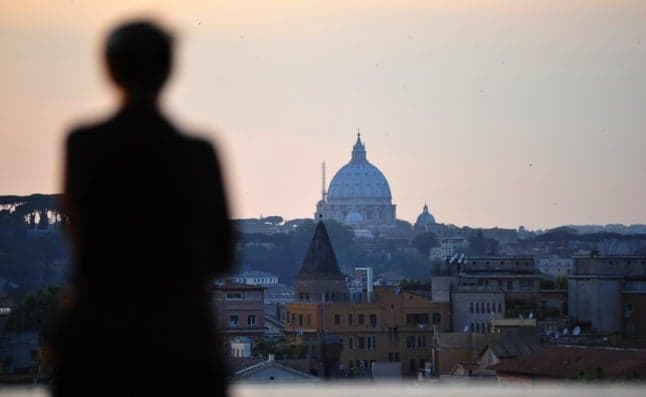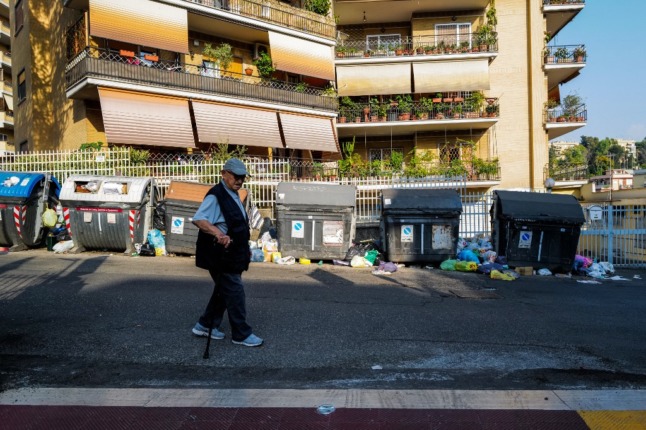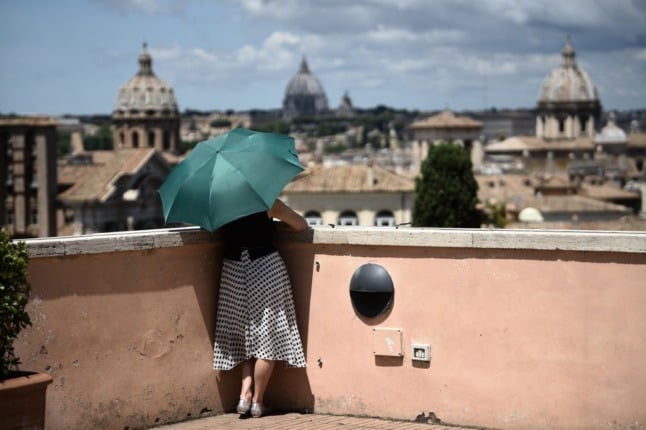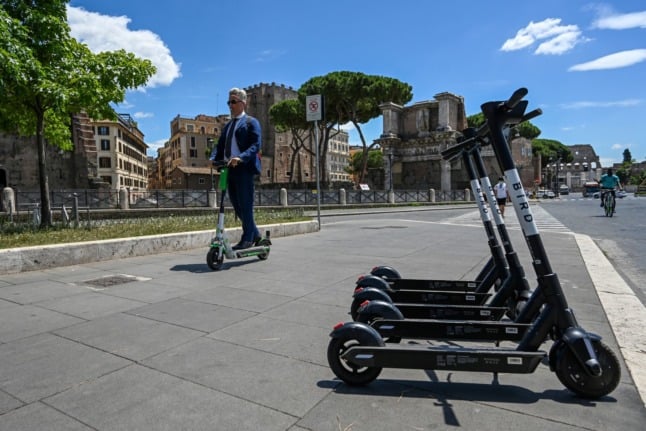OPINION: I used to hate living in Rome, but I learned to love it

Yet another survey of Rome’s foreign residents has rated the Italian capital dismally for quality of life. Jessica Phelan explains why she too disliked the city when she first moved here, and what helped to change her mind.
If you’d told me four years ago that I’d be coming to Rome’s defence, I would have told you: Ma va’. Yeah right, get out of town. And I would have said I’d be long gone myself.
And yet, as the latest InterNations survey of expats around the world puts Rome in last place for city life and work, here I am not only still living here but saying out loud: this place isn’t so bad.
It’s not that I don’t get where my unhappy fellow foreigners are coming from. I never dreamed of Rome before I moved here and found it far from dreamy once I arrived, in summer 2017. I’d grown up a short flight away (the UK) and lived in European capitals (Paris, Berlin) for several years, and after a stint further afield (Japan), I naively thought that moving to Rome would feel like coming home.
Instead I found myself complaining to anyone who would listen about the same things that InterNations’ respondents listed as Rome’s downsides. The unreliable public transport. The scant public services. The politicians on the take. The provincialism. The rubbish – good grief, the rubbish. The inequality and lack of opportunities for young people – and lack of young people themselves, as it seemed in certain neighbourhoods.
READ ALSO: Rome and Milan ranked ‘worst’ cities to live in by foreign residents – again
Sure, I liked the food and I couldn’t argue with the weather, but it felt frivolous to enjoy the small pleasures amid what I began to see as existential flaws. They spiralled for me into the impression of a city on the brink: the trash is piled shoulder-high because people here don’t care about anyone else, I told myself.
The fact everyone assumes I’m a tourist means they’re not used to anyone who doesn’t look or sound like them. I’m struggling to meet other young professionals – it must be a sign that the best and the brightest have all left. Because really, who’d choose to live here?

Photo: Andreas SOLARO/AFP
Partly it was because I didn’t feel I had chosen to live here. I had moved for my American partner’s teaching job, and nothing was more alienating than encountering people who were stubbornly, unaccountably, in love with the place – or an idea of it. An awkward pause would ensue as I contemplated whether to mumble something innocuous about gelato or take it upon myself to debunk their romantic notions and expose what I was convinced was the ‘real’ Rome – dirty, dysfunctional, doomed.
It wasn’t all in my head. As the InterNations survey has shown for several years straight, many foreign transplants report deep dissatisfaction with the city. So do Romans as a whole: one survey in 2020 found that most residents said their quality of life had worsened in the past five years. Global studies have named Rome one of the unhealthiest cities in Europe, and its roads some of the most dangerous. When Italians compile the list of the ‘best places to live in Italy’, there’s a reason why Rome never comes close to the top ten.
In fact, every time I lamented the city’s decline, I fitted in better than I realised: no one complains more about Rome than Romans themselves.

Photo: Alberto PIZZOLI/AFP
There was perverse comfort to be had in realising that people born and raised here saw the same things I did and found them just as galling. La grande monnezza, they call it: forget ‘the great beauty’ (la grande bellezza), it’s the great rubbish dump. Roma fa schifo, as a popular local blog has it. Rome is disgusting.
Huh, I began to think I scrolled through photos of egregiously parked cars or smirked at another meme about the incompetents in city hall, maybe we can get on after all. It was a glimpse of a dark, deeply cynical humour that was one of the first things about Rome I had to admit I liked.
READ ALSO:
- The ten ‘best’ places to live in Italy in 2021
- The very best Italian towns to move to – according to people who live in them
- Ten things you need to know before moving to Italy
Gradually, other qualities forced their way into view. I moved from a stuffy neighbourhood in the west of the historic centre to outside the city walls in the east and discovered that yes, other people under 50 do live here, no, not every foreigner is a tourist or study-abroad student, and thank goodness, not every restaurant serves only Italian food. Our new apartment was bigger, and bigger by far than anything our relatively modest incomes would have got us in the capitals of our home countries.
In fact, I suspected I wasn’t living in a capital city at all. Milan is where most of the money and opportunities within Italy are to be found, which has long made it a more logical place to move to for Italians and foreigners alike. I envy Milan’s metamorphosing skyline and cosmopolitan population – things I associate with ‘real’ cities.
But what do you know: if Rome comes 57th in the InterNations survey, Milan comes 56th. The responses suggest that housing is more expensive and harder to find up there, and the cost of living higher.
I’ll leave it to people who live there to say what it’s really like, but I wonder if there are other trade-offs: I’d take the people-watching and window-shopping in Milan over Rome any day, but would I have to wear the ‘right’ clothes to fit in? I might have more chances to get ahead, but would I be judged on my job title or salary, and would people be more competitive? For better or worse, these aren’t things I have to worry about in Rome.
OPINION: Why Milan is a much better city to live in than Rome
Lucky for me I can afford not to: I’m not one of the 41 percent of foreign residents in Rome who told InterNations their disposable household income is not enough to cover expenses. Salaries are low here, and the cost of living – not visiting – can be higher than you might think. I’m in the privileged position of working for international employers, who pay better than local ones, and of splitting the bills with someone else in the same boat. We’re comfortable, but Rome isn’t the place to make your fortune.
So it’s no economic powerhouse. But culturally it’s got more life than I first gave it credit for. The things I’d assumed were missing altogether – new music, interesting events, a mix of people and backgrounds – were all there, they were just on a smaller scale and correspondingly harder to find. (Places to start looking: mailing lists, venues’ Facebook or Instagram pages, Zero.)

Photo: Filippo Monteforte/AFP
In other cities I felt I’d made inroads by the end of the first year; in Rome, I was still at least another year away from meeting the friends who’d become my group here and, in turn, introduce me to people and places I wouldn’t have found on my own.
More than other cities, people say that Rome – the Rome that’s not in guidebooks, at least – is da scoprire, ‘to discover’ or even ‘unearth’. While you’re digging, having an ‘in’ can make all the difference.
In some ways, Covid-19 also helped to rehabilitate Rome for me. The seriousness with which most people took the pandemic, and the camaraderie my neighbours showed throughout that first bewildering lockdown, proved that Romans were more than capable of caring for strangers. The months that followed, when we were confined to city or regional limits, taught me to appreciate the possibilities I might otherwise have ignored: travel might be impossible, but at least I had woods, lakes, mountains, waterfalls and the Mediterranean on my doorstep.
Other things I had to work around, or simply live with. I’m as convinced now as I was four years ago that Rome’s public transport system is woefully inadequate, but now I mainly avoid it: I walk or cycle as much as I can. In fact a whole alternative network of shared transport has sprung up in the time I’ve been here, from e-bikes to car shares and scooters, or monopattini.
 Photo: Filippo Monteforte/AFP
Photo: Filippo Monteforte/AFP
I’m yet to see a fix for the city’s rubbish problem, but I no longer assume it’s all the residents’ fault. It’s the result of decades of misuse of public funds, graft and organized crime – hardly reassuring, but marginally less bleak than thinking that none of your neighbours give a damn.
Because always, of course, there are people trying to improve things – by protesting, by voting, by picking up litter, even by filling in potholes on the sly. (Remember that if you’re a citizen of another EU country living in Rome, you have the right to vote in city elections too.) Doing the work yourself doesn’t absolve the authorities of the responsibility to do it, but in the meantime, as one acquaintance put it, at least your sidewalk is clean.
And those small pleasures: I finally gave myself permission to enjoy them. I like cracker-thin Roman pizza, supposedly kept from rising by the city’s hard water. I like sun that dries my laundry even in December. I like the view of mountains on a clear day. I like the light that glows golden around half an hour before sunset and works a kind of magic on ochre walls and brick bell towers and crumbling aqueducts.
In my fifth year here, I know now that these things don’t blind me to Rome’s faults, nor do I have to pretend not to see them to prove I’m not just another tourist. I live here; sometimes it’s bad; and most days, at about 5pm, looking over the rooftops, it’s good.
This article was first published in 2021.
Comments (4)
See Also
If you’d told me four years ago that I’d be coming to Rome’s defence, I would have told you: Ma va’. Yeah right, get out of town. And I would have said I’d be long gone myself.
And yet, as the latest InterNations survey of expats around the world puts Rome in last place for city life and work, here I am not only still living here but saying out loud: this place isn’t so bad.
It’s not that I don’t get where my unhappy fellow foreigners are coming from. I never dreamed of Rome before I moved here and found it far from dreamy once I arrived, in summer 2017. I’d grown up a short flight away (the UK) and lived in European capitals (Paris, Berlin) for several years, and after a stint further afield (Japan), I naively thought that moving to Rome would feel like coming home.
Instead I found myself complaining to anyone who would listen about the same things that InterNations’ respondents listed as Rome’s downsides. The unreliable public transport. The scant public services. The politicians on the take. The provincialism. The rubbish – good grief, the rubbish. The inequality and lack of opportunities for young people – and lack of young people themselves, as it seemed in certain neighbourhoods.
READ ALSO: Rome and Milan ranked ‘worst’ cities to live in by foreign residents – again
Sure, I liked the food and I couldn’t argue with the weather, but it felt frivolous to enjoy the small pleasures amid what I began to see as existential flaws. They spiralled for me into the impression of a city on the brink: the trash is piled shoulder-high because people here don’t care about anyone else, I told myself.
The fact everyone assumes I’m a tourist means they’re not used to anyone who doesn’t look or sound like them. I’m struggling to meet other young professionals – it must be a sign that the best and the brightest have all left. Because really, who’d choose to live here?

Partly it was because I didn’t feel I had chosen to live here. I had moved for my American partner’s teaching job, and nothing was more alienating than encountering people who were stubbornly, unaccountably, in love with the place – or an idea of it. An awkward pause would ensue as I contemplated whether to mumble something innocuous about gelato or take it upon myself to debunk their romantic notions and expose what I was convinced was the ‘real’ Rome – dirty, dysfunctional, doomed.
It wasn’t all in my head. As the InterNations survey has shown for several years straight, many foreign transplants report deep dissatisfaction with the city. So do Romans as a whole: one survey in 2020 found that most residents said their quality of life had worsened in the past five years. Global studies have named Rome one of the unhealthiest cities in Europe, and its roads some of the most dangerous. When Italians compile the list of the ‘best places to live in Italy’, there’s a reason why Rome never comes close to the top ten.
In fact, every time I lamented the city’s decline, I fitted in better than I realised: no one complains more about Rome than Romans themselves.

There was perverse comfort to be had in realising that people born and raised here saw the same things I did and found them just as galling. La grande monnezza, they call it: forget ‘the great beauty’ (la grande bellezza), it’s the great rubbish dump. Roma fa schifo, as a popular local blog has it. Rome is disgusting.
Huh, I began to think I scrolled through photos of egregiously parked cars or smirked at another meme about the incompetents in city hall, maybe we can get on after all. It was a glimpse of a dark, deeply cynical humour that was one of the first things about Rome I had to admit I liked.
READ ALSO:
- The ten ‘best’ places to live in Italy in 2021
- The very best Italian towns to move to – according to people who live in them
- Ten things you need to know before moving to Italy
Gradually, other qualities forced their way into view. I moved from a stuffy neighbourhood in the west of the historic centre to outside the city walls in the east and discovered that yes, other people under 50 do live here, no, not every foreigner is a tourist or study-abroad student, and thank goodness, not every restaurant serves only Italian food. Our new apartment was bigger, and bigger by far than anything our relatively modest incomes would have got us in the capitals of our home countries.
In fact, I suspected I wasn’t living in a capital city at all. Milan is where most of the money and opportunities within Italy are to be found, which has long made it a more logical place to move to for Italians and foreigners alike. I envy Milan’s metamorphosing skyline and cosmopolitan population – things I associate with ‘real’ cities.
But what do you know: if Rome comes 57th in the InterNations survey, Milan comes 56th. The responses suggest that housing is more expensive and harder to find up there, and the cost of living higher.
I’ll leave it to people who live there to say what it’s really like, but I wonder if there are other trade-offs: I’d take the people-watching and window-shopping in Milan over Rome any day, but would I have to wear the ‘right’ clothes to fit in? I might have more chances to get ahead, but would I be judged on my job title or salary, and would people be more competitive? For better or worse, these aren’t things I have to worry about in Rome.
OPINION: Why Milan is a much better city to live in than Rome
Lucky for me I can afford not to: I’m not one of the 41 percent of foreign residents in Rome who told InterNations their disposable household income is not enough to cover expenses. Salaries are low here, and the cost of living – not visiting – can be higher than you might think. I’m in the privileged position of working for international employers, who pay better than local ones, and of splitting the bills with someone else in the same boat. We’re comfortable, but Rome isn’t the place to make your fortune.
So it’s no economic powerhouse. But culturally it’s got more life than I first gave it credit for. The things I’d assumed were missing altogether – new music, interesting events, a mix of people and backgrounds – were all there, they were just on a smaller scale and correspondingly harder to find. (Places to start looking: mailing lists, venues’ Facebook or Instagram pages, Zero.)

In other cities I felt I’d made inroads by the end of the first year; in Rome, I was still at least another year away from meeting the friends who’d become my group here and, in turn, introduce me to people and places I wouldn’t have found on my own.
More than other cities, people say that Rome – the Rome that’s not in guidebooks, at least – is da scoprire, ‘to discover’ or even ‘unearth’. While you’re digging, having an ‘in’ can make all the difference.
In some ways, Covid-19 also helped to rehabilitate Rome for me. The seriousness with which most people took the pandemic, and the camaraderie my neighbours showed throughout that first bewildering lockdown, proved that Romans were more than capable of caring for strangers. The months that followed, when we were confined to city or regional limits, taught me to appreciate the possibilities I might otherwise have ignored: travel might be impossible, but at least I had woods, lakes, mountains, waterfalls and the Mediterranean on my doorstep.
Other things I had to work around, or simply live with. I’m as convinced now as I was four years ago that Rome’s public transport system is woefully inadequate, but now I mainly avoid it: I walk or cycle as much as I can. In fact a whole alternative network of shared transport has sprung up in the time I’ve been here, from e-bikes to car shares and scooters, or monopattini.

I’m yet to see a fix for the city’s rubbish problem, but I no longer assume it’s all the residents’ fault. It’s the result of decades of misuse of public funds, graft and organized crime – hardly reassuring, but marginally less bleak than thinking that none of your neighbours give a damn.
Because always, of course, there are people trying to improve things – by protesting, by voting, by picking up litter, even by filling in potholes on the sly. (Remember that if you’re a citizen of another EU country living in Rome, you have the right to vote in city elections too.) Doing the work yourself doesn’t absolve the authorities of the responsibility to do it, but in the meantime, as one acquaintance put it, at least your sidewalk is clean.
And those small pleasures: I finally gave myself permission to enjoy them. I like cracker-thin Roman pizza, supposedly kept from rising by the city’s hard water. I like sun that dries my laundry even in December. I like the view of mountains on a clear day. I like the light that glows golden around half an hour before sunset and works a kind of magic on ochre walls and brick bell towers and crumbling aqueducts.
In my fifth year here, I know now that these things don’t blind me to Rome’s faults, nor do I have to pretend not to see them to prove I’m not just another tourist. I live here; sometimes it’s bad; and most days, at about 5pm, looking over the rooftops, it’s good.
This article was first published in 2021.
Join the conversation in our comments section below. Share your own views and experience and if you have a question or suggestion for our journalists then email us at [email protected].
Please keep comments civil, constructive and on topic – and make sure to read our terms of use before getting involved.
Please log in here to leave a comment.